Overview of the Innovator Founder visa
The Innovator Founder Visa is a suitable visa if you are an entrepreneur or business person seeking to establish an innovative business in the UK. Your proposed business must be innovative, viable and scalable. You must have generated or have significantly contributed to the business idea. Your proposed business must be supported by a business plan, which has been supported by an endorsing body. You must intend to have a key role in the day-to-day management and development of the business. You do not need a specific level of funds to invest in your business.
The Innovator Founder Visa is valid for 3 years, which can directly lead to indefinite leave to remain at the end of the 3 year period. You can bring your partner to the UK and your children under the age of 18. They can apply for indefinite leave to remain after 5 years.
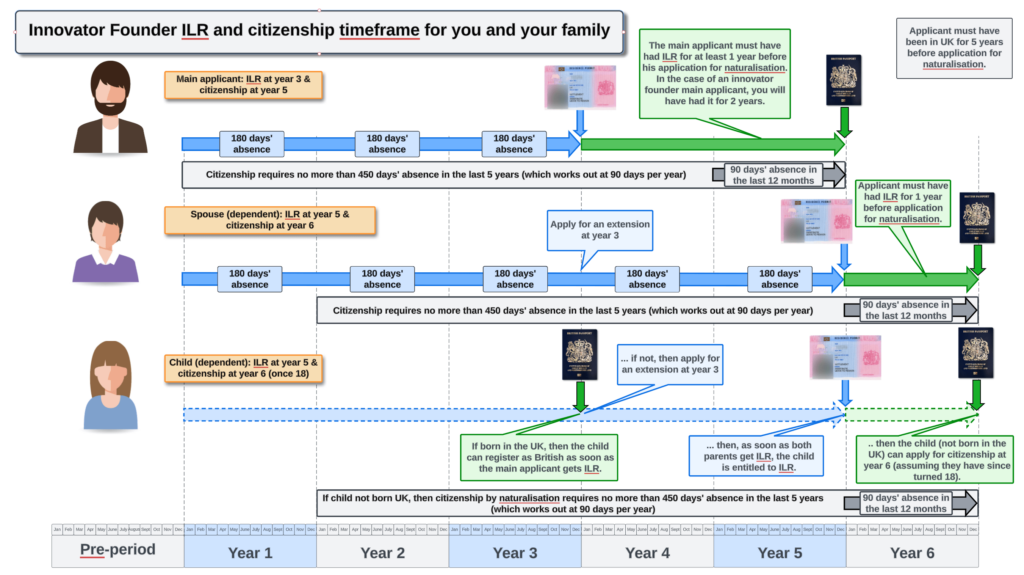
Endorsement requirements for the Innovator Founder visa
You must have an endorsement letter before applying for the visa.
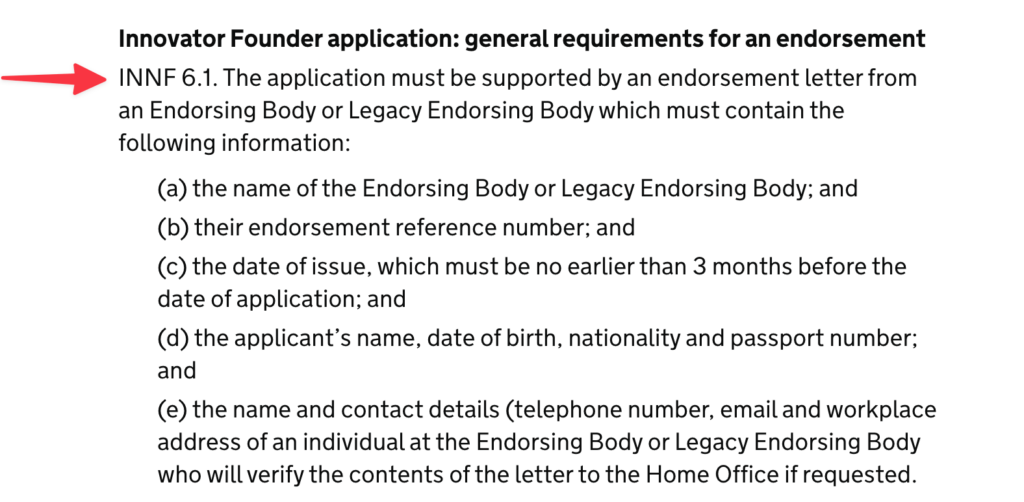
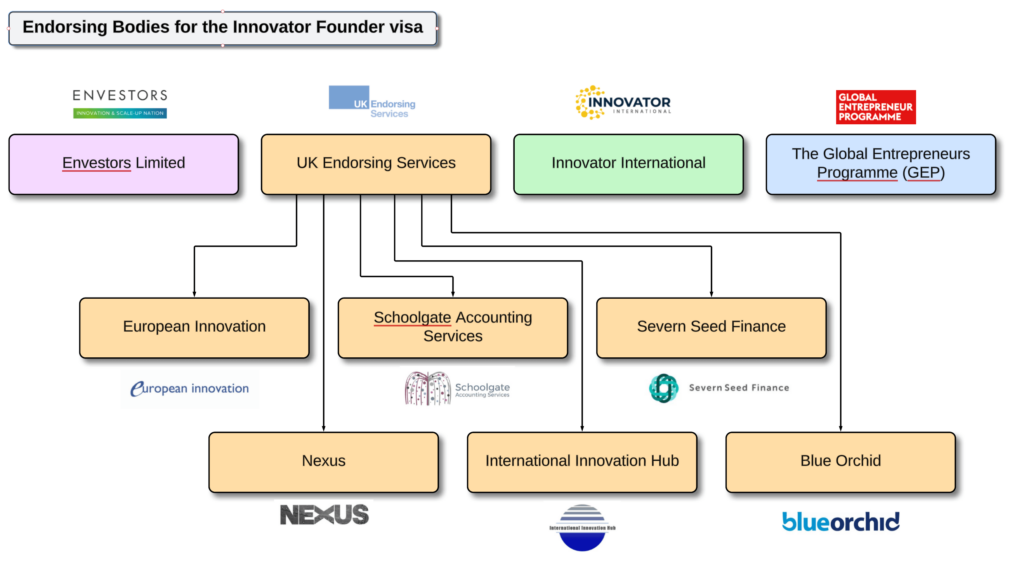
The business plan requirement
There is a requirement that you:
- Have a business plan. You must have either generated or made a significant contribution to the ideas in that business plan;
- Demonstrate that you will have a day-to-day role in carrying out the business plan;
- Confirm that you will have at least two Contact point meetings with the endorsing body; and
- Be either the sole founder or an instrumental member of the founding team.
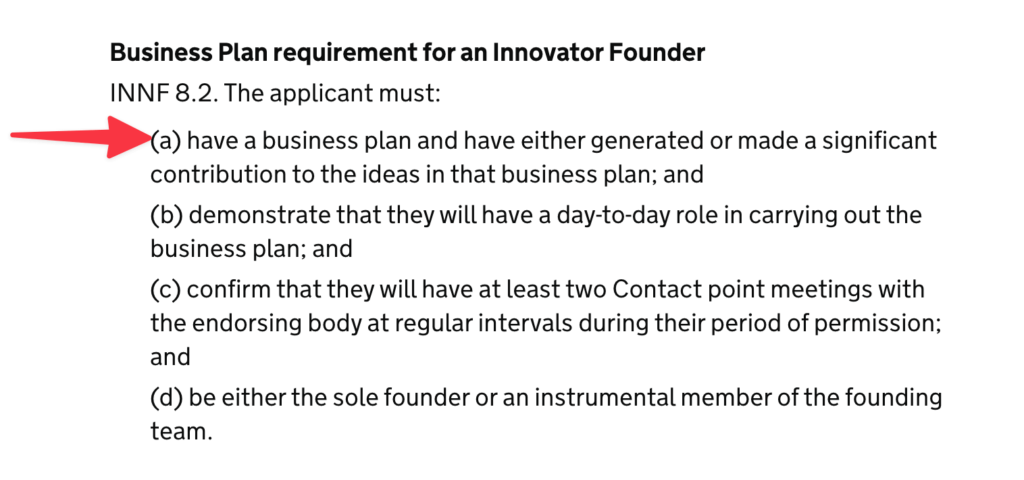
When the endorsing body considers your application for an endorsement, it will consider:
- How you came up with the business idea;
- How your skills and experience are relevant;
- Whether you are simply a passive investor. The Innovator Founder route cannot be used simply to facilitate investment.
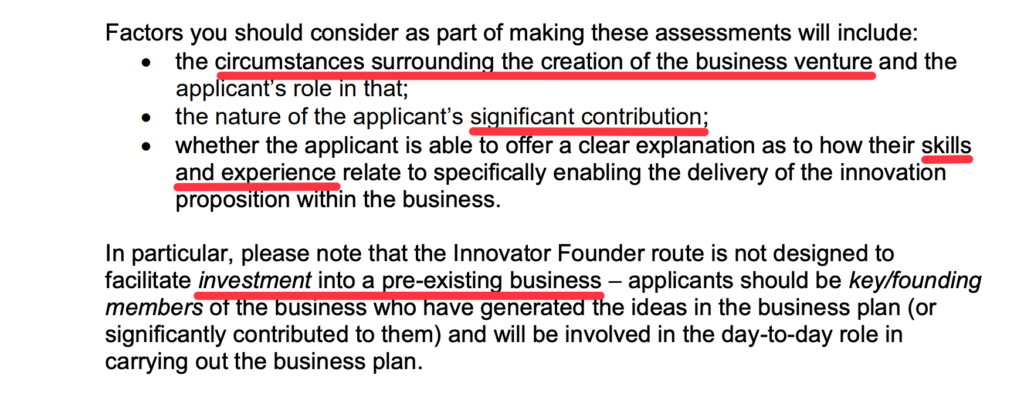

The innovative, viable and scalable business requirement
Your business idea must be innovative, viable and scalable. The key points are:
- There must be a market for your product;
- You must be able to afford your start-up costs;
- You must have the knowledge and skills necessary to run the business;
- Your business must have the potential for job creation;
- You must have adequate milestones in your business plan;
- You must have a plan for growing your business, both in the UK and internationally.
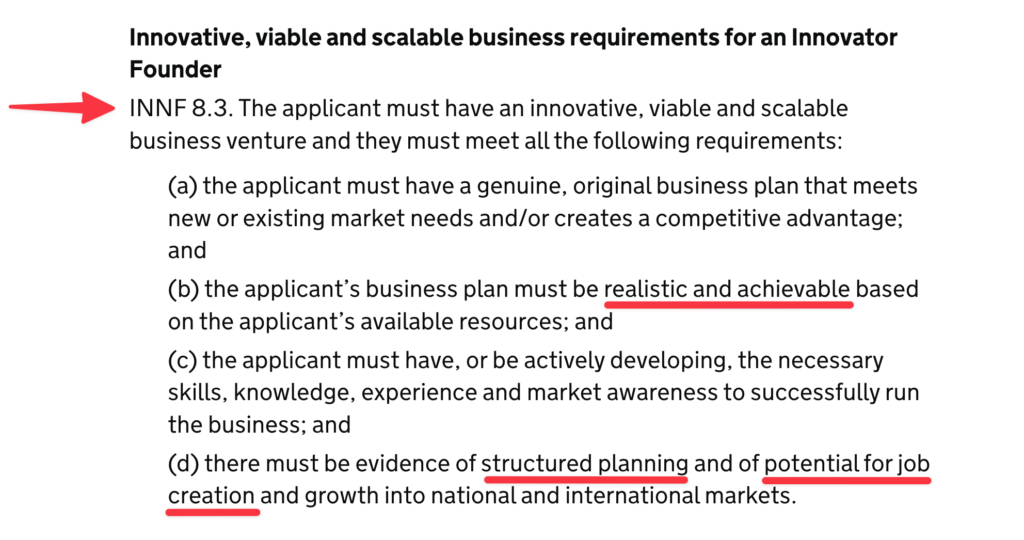
When the endorsing body is deciding if your business is ‘innovative’, it will consider:
- If your business has a unique selling proposition;
- If the business is easy to replicate;
- If innovation is key to your business; and
- You must be carrying out the innovation in your business. You cannot outsource the innovative element.
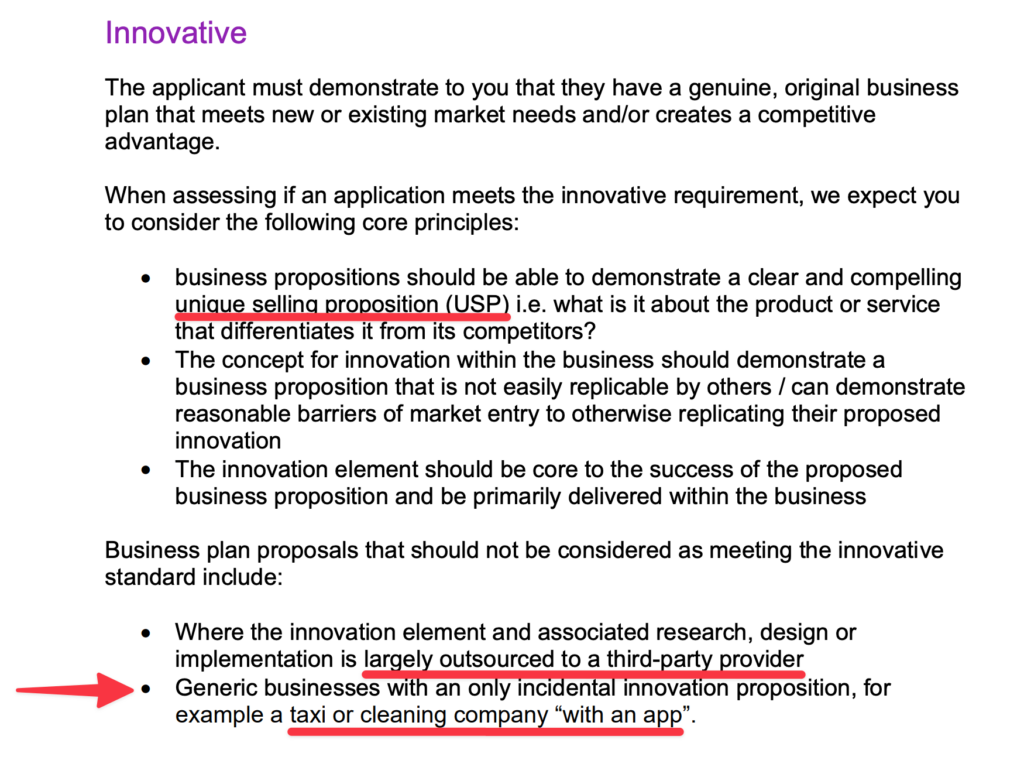
When the endorsing body is deciding if your business is ‘viable’’, it will consider:
- If you have enough money to deliver the business;
- If you have evidence to support your financial projections; and
- If there is demand for the business.
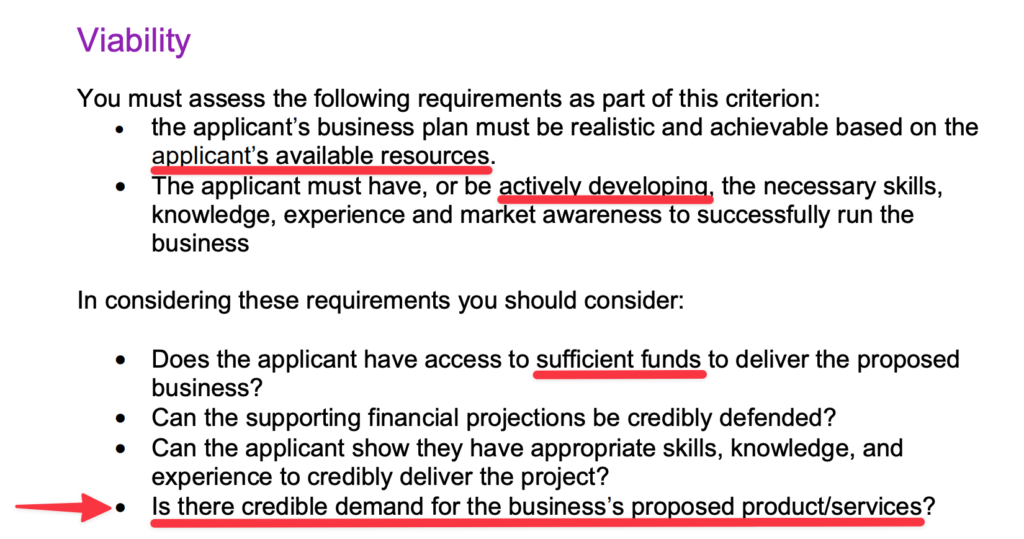
When the endorsing body is deciding if your business is ‘scalable’, it will consider:
- Whether the company will grow; and
- If you have properly researched your projections.
Visa requirements for the Innovator Founder visa
In order to satisfy the Innovator Founder visa requirements you must:
- Be at least 18 years old;
- Have applied for the innovator visa application within 3 months of receiving an endorsement letter;
- Provide documents to prove your identity;
- Be fluent in English;
- Have enough funds to support yourself in the UK; and
- Provide a tuberculosis certificate, if required.
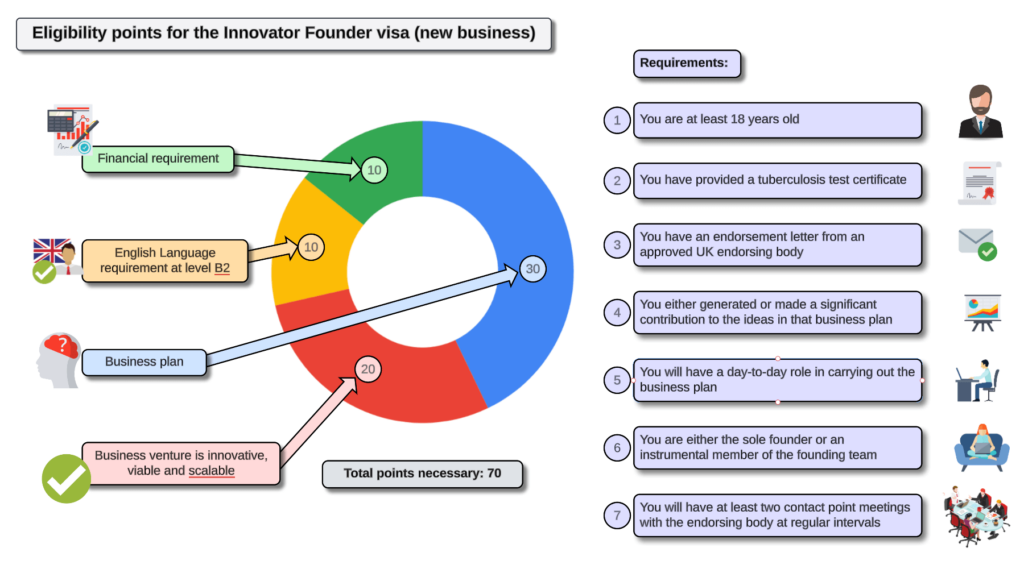
English requirement for the Innovator Founder visa
The level required is B2. This means (based on IELTS grades):
Listening: 5.5
Speaking: 5.5
Reading: 5.5
Writing: 5.5
The IELTS Test you take must be ‘IELTS for UKVI’. Be careful about this when you are booking it.
The certificate you get needs to have the IELTS secure reference number stated on it. This is located on the bottom right of the form.
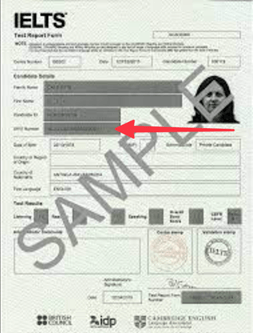
Financial requirement for the Innovator Founder visa
You need to have £1,270 for 28 days straight.
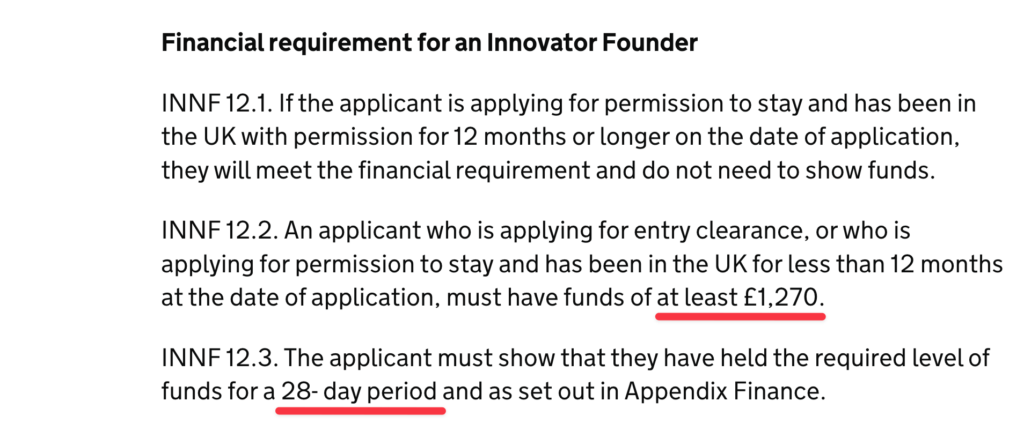
The funds must be in a cash account, so not in an investment account.

You need to get the bank statement before making your application for the Innovator Founder visa. It must be dated no more than 31 days before your application date.

The “date of application” for the purposes of calculating the 31 days, is the date that you pay for the Innovator Founder visa application. You are prompted to make the payment when you submit the online application.

For the purposes of calculating the 28 days, the Home Office does not use the date of the bank statement, but rather the date of the closing balance on the bank statement. Those may be the same, but they may be different.

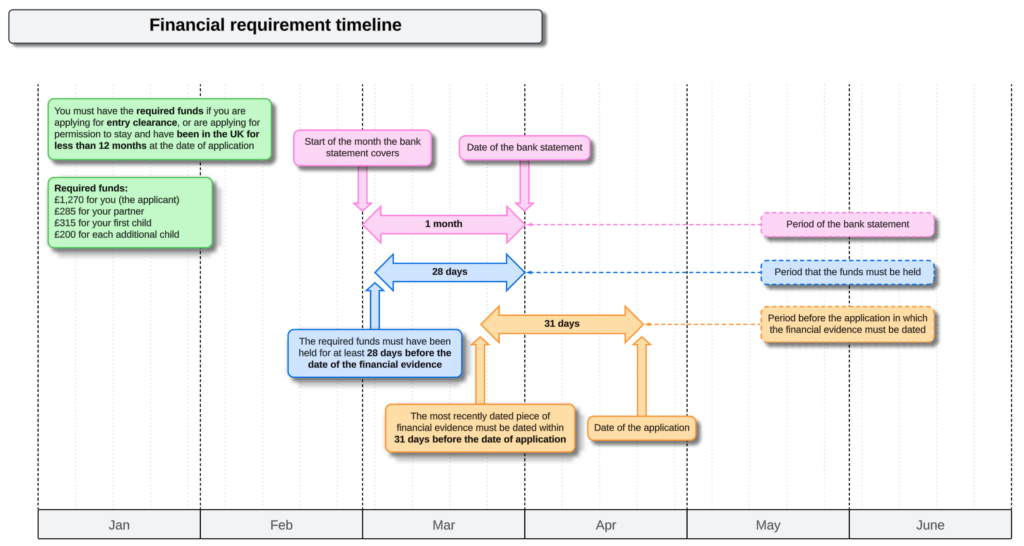
Conditions you need to comply with on the Innovator Founder visa
It used to be the case (under the ‘old’ Innovator visa), that you could not take up work alongside running your business. Now, however, under the Innovator Founder visa, you can take up full time employment in qualifying skilled roles. One of the things you need to think about is that the business must be ‘active and trading’. So if all of the money you earn is from your job, then you will not qualify for an extension or indefinite leave to remain. Some revenue needs to come into the business.
The other important condition to highlight is that you should not claim public funds. You can use the NHS (that is what you are paying for when you pay the NHS Surcharge), but you cannot claim, for example, Job Seekers Allowance. I am often asked whether a UK government business grant is permissible. As long as it goes to your company (rather than you personally), then this should be fine. Check with me if in doubt.

Application process and timeframe
The application process for an innovator visa can be broken down into 5 stages:
- Check the eligibility requirements
Ensure you meet the eligibility requirements for the Innovator Founder visa (above). Start preparing your business plan.
- Apply for an Endorsement
You need to submit a detailed business plan which meets all the requirements (see above). The endorsing body will have interviews and conduct thorough checks of your business.
- Receive an endorsement letter
If the proposed business meets the requirements, you will receive an endorsement letter from the endorsing body. This will usually take between 2 weeks to 1 month.
- Send your visa application to Home Office
Having obtained an endorsement letter, and the other documents you require to apply, you will then apply online for an Innovator Founder visa using the prescribed form and upload your evidence. You can apply online. It will usually take about 2 weeks to prepare.
- Receive a decision on your Visa
If your application is approved by the Home Office, then you will be granted permission to for a maximum period of 3 years.
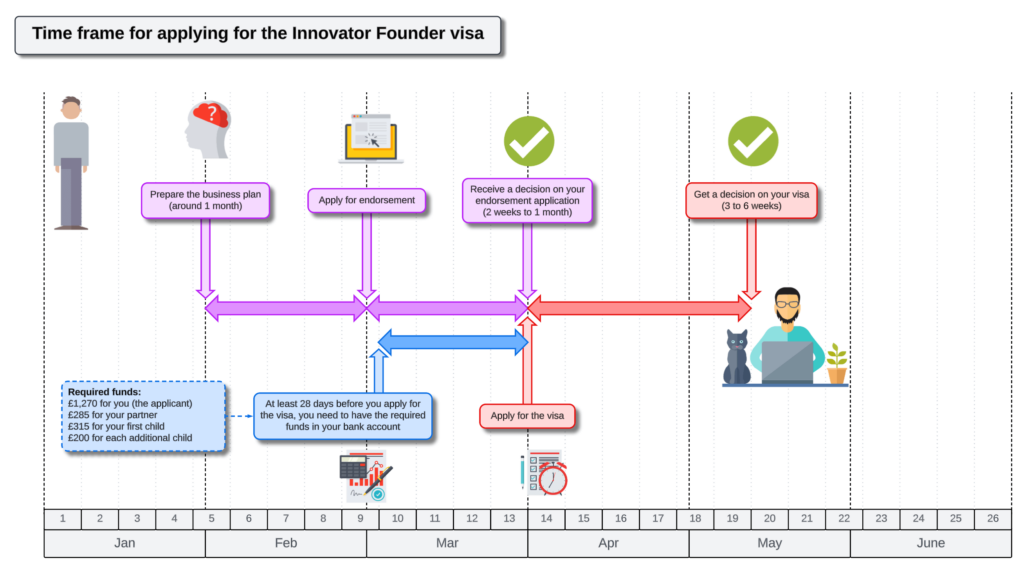
Timeframe
After you have sent in your online application, you will usually get a decision via email or letter within:
3 weeks, if you are outside the UK; or
8 weeks, if you are in the UK.
Depending on how and when you are applying, there are ‘Priority’ and ‘Super Priority’ visa processing options available to speed up these timeframes.
Fees
The fees for the Innovator Founder visa are £1,036 (if applying from outside of the UK) or £1,292 (if applying from inside of the UK).
How to bring your partner on the Innovator Founder visa
You can bring your partner or child with you on an Innovator Founder visa. Each family member must make a separate online application before travelling to the UK. They can make this application before your application has been decided or afterwards. In any event, your Innovator Founder visa must be granted in order for your partner or child to get their dependent visas.
In order to bring your partner, then she (for the purposes of the example) must meet the following requirements:
- Be at least 18 years old;
- Provide documents to prove her identity;
- Have a provided a tuberculosis certificate, if required;
- Be legally married or in a civil partnership with you. Or she must be in a genuine relationship with you (you must have lived together for at least two years).
- If she has been in the UK for less than 12 months, then she must have enough money to support herself (£285); and
- You must be granted an Innovator Founder visa.
If successful, then your partner will be granted a visa to stay for the same amount of time as you.
As for your child, he must be under 18 (so 17 is the maximum age permissible);
The key point is funds. You need to show an extra £285 for your wife (in our example), and £315 for your first child, plus £200 for your second child.

Pathway to indefinite leave to remain for you and your family
At year 3 on the Innovator Founder visa you can apply for indefinite leave to remain. Your wife (in our example) needs an extension at year 3, then she can apply for ILR at year 5. If your child was born in the UK, then he can get indefinite leave to remain once you get it (at year 3). If your child was born out of the UK, then he can get ILR as soon as both you and your partner get it (so at year 5, assuming your wife gets it at year 5).
What you need to show to get indefinite leave to remain as an Innovator Founder
The requirements remain the same (although are interpreted differently) than under the old Innovator visa.
In broad terms, for the Innovator Founder visa, you must prove that:
- Your business has achieved its targets;
- Your business is registered with you as a director or member at Companies House;
- Your business is active and will survive for a further 12 months;
- You have had an active role in the business;
- You will need to have attended the regular contact meetings.
- You must have achieved two of the following:
- £50,000 has been invested;
- Your customer base has doubled and is higher than your competitors;
- You have applied for intellectual property protection;
- You have a gross revenue of £1 million. However, if you gross only £500,000 but £100,000 of that revenue is from exporting overseas this will also count.
- Your business has created 10 full-time jobs. However, if you only create 5 jobs but they each have a salary of £25,000 this will also count.
For most people this means satisfying the £50k requirement and the IP requirement.
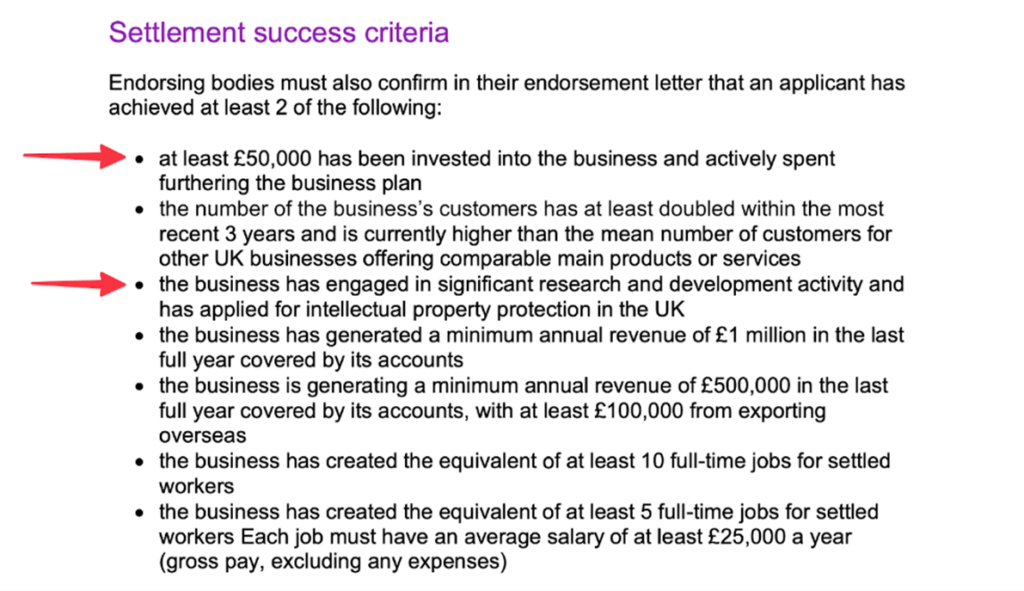
People forget that the business does also need to be trading (so you need to have actually sold something). This, in turn, presupposes that the UK company you have incorporated has actually secured a corporate bank account. This would be the account into which the £50,000 has been paid (as working capital), and then spent. So it is not sufficient to include spending from your personal account.
The other crucial point is that to get ILR (but also to get an extension), you do need to show that you have made significant achievements. This is not judged against any external or objective criteria. Rather, it is assessed solely on what you said you would do in your business plan. This is a problem if, e.g. (1) there was no business plan, (2) there was a business plan, but it did not state any milestones or measurable achievements, or (3) the business plan was over optimistic in what it said the business would do financially. I have seen people (who have not worked with me for the original visa application), in all three scenarios.
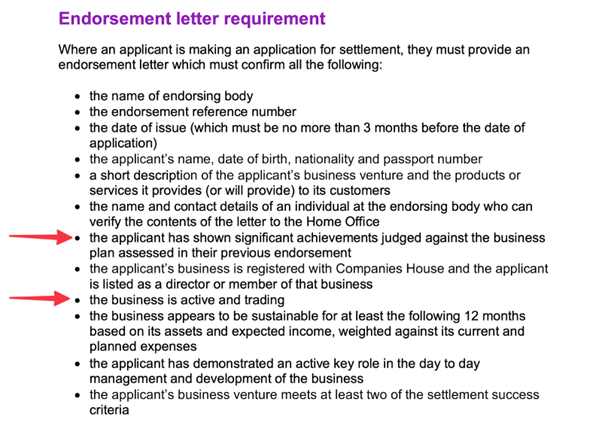
Timing considerations for your application for settlement on the Innovator Founder visa
You can apply 28 days before you complete year 3. The 3 year “qualifying period” can be counted from the point that you were first granted entry clearance (so before you actually entered the UK). However, the time after grant but before entry counts as an “absence”. You are only allowed 180 days out of the UK before breaking your “continuous residence”. Breaking it would mean that your 3 year “qualifying period” would reset. “Resetting the clock” in this way is to be avoided, as you would need an extension to accrue the 3 years required for ILR.
Bear in mind that you also need to take the Knowledge of Life in the UK test.
Your wife (in our example) and child, would extend at year 3, as your wife needs 5 years to be able to apply for ILR. Your child can only apply for ILR once she gets ILR. This means that your child also has to wait 5 years. Your wife also has the 180 day restriction before her “qualifying period” (so, in her case, 5 years) resets. Your child actually has no absence requirement, but this is usually of no use, if (in our example), your child is with his mother the whole time.
- You must apply within 3 months of receiving your endorsement letter;
- You must provide documents to prove your identity;
- You must have spent 3 years in the UK as an innovator founder;
- For each year, you must not have spent more than 180 days outside of the UK;
- You must pass the Knowledge of Life in the UK test;
- You must apply from within the UK.
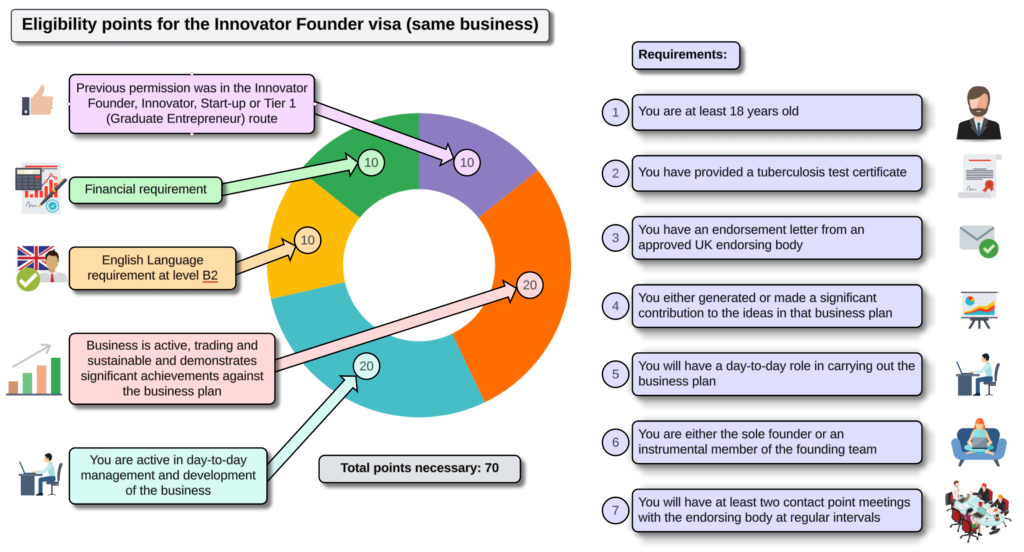
If your application does not meet the requirements for settlement the Home Office may grant you and your dependents permission to stay as an innovator founder for a further three years. You must be physically in the UK to make the application for settlement.
Pathway to citizenship for you and your family

Your route to citizenship under the Innovator Founder visa
Once you have got ILR at year 3, you will need to wait until year 5 to get citizenship. You must have:
- Lived in the UK for at least 5 years;
- Not have had more than 450 days outside of the UK from years 1 to 5 (which works out at 90 days per year, so if you are planning ahead, you will want to plan on the basis of “maximum 90 days out per year for citizenship” rather than just “maximum 180 days out for ILR”);
- In the 12 months before your citizenship application, you must not have had more than 90 days out of the UK;
- Hold indefinite leave to remain (having secured it at year 3 as the Innovator Founder);
- Prove that you were in the UK exactly 5 years before you apply;
- Have adequate English. You will have already satisfied this requirement when getting the Innovator Founder visa originally;
- Be over 18;
- Be of good character;
- Have passed the life in the UK test; and
- Intend to continue living in the UK.
Your partner’s route to citizenship
Your wife (in our example) needs to wait until year 6 for citizenship. As I explained above, she will need to extend at year 3 (assuming you get ILR at year 3), and then apply for ILR at year 5. She needs to then wait an extra year (i.e. until completing year 6) before applying for citizenship.
Your child’s route to citizenship
Their route to citizenship depends whether they were born inside or outside the UK.
- If your child was born in the UK, then they can get citizenship at year 3, once you get ILR. An application must be made for their registration.
- If your child was not born in the UK, they can get ILR at year 5 when your wife (in our example) gets it. Then at year 6 your child can apply for citizenship, but they must have since turned 18 (if not then they need to wait until they are 18).
